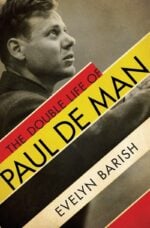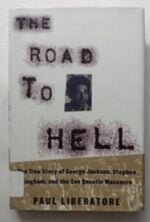
American universities already resembled insane asylums in 1987, when Jesse Jackson egged on the philistines at Stanford to chant, “Hey hey, ho ho, Western Civ has got to go.” No less barbaric than the summer of 2020 rioters, human termites disguised as professors and administrators, had already weakened higher education from within; the irreverent reverend sought to obliterate its vestigial foundation. American universities didn’t just collapse like London Bridge. Their demolition more closely resembled the nihilistic 9/11 attacks on America. And as with 9/11, we know who did it.
If Westerners reconvene at Nuremberg to try those who pillaged our universities, Evelyn Barish’s 2014 biography of Paul de Man should be the first piece of evidence submitted to the tribunal. De Man, along with Jacques Derrida, dreamt up “deconstruction,” a critique of Platonism that poisoned humanities departments. Barish supplies reams of startling evidence linking de Man’s evil thought to his equally evil upbringing and character.
Cue the Deliverance banjo music, please: de Man’s mother and father were first cousins. His older brother, who later committed suicide, had raped their cousin. His father’s mistress visited every Wednesday for violin practice. After finding his jilted mother’s body swinging from a tree, de Man abandoned his bastard children, beat his wife, and—now cue Wagner’s Götterdämmerung please—collaborated with the Nazis in his native Belgium. With nothing to lose except his swastika armband, postmodern academia’s future godhead started all over again in America.
Upon arrival, de Man befriended Trotskyist New York intellectuals and sweet-talked Mary McCarthy into securing him a teaching gig at Bard College despite his lack of a bachelor’s degree. But driving around rural upstate New York without a license and living bigamously with a second wife left him bored and restless.
So he set off for Harvard, where he BS’d his way into the comparative literature doctoral program, fortuitously intercepting his sketchy academic transcript from Belgium. Henry Kissinger even hired him, off the books, for private French lessons. Readers will be stupefied to learn how de Man eluded his comprehensive exams and submitted a truncated dissertation over the objections of his advisors. PhD in hand, he corrupted generations of impressionable students at Cornell, Johns Hopkins, and Yale.
He who says immigrants built America must acknowledge this one destroyed it.
—John Greenville

As the 1960s recede into the distance, it becomes easier to forget the atrocities the left delivered in that period. The Road to Hell is a chilling jogging of the memory.
It is the story of George Jackson, a career criminal turned radical celebrity and author of two rambling books advocating violent racial revolution. Paul Liberatore describes in harrowing detail Jackson’s vile politics, his mass-murdering effort to escape from prison, and the trial of one of his white allies for aiding him in this crime.
On Aug. 21, 1971, Jackson’s radical friends smuggled into California’s San Quentin State Prison a small 9mm Astra pistol, hidden in a hollowed-out tape recorder, which Jackson used to take hostages. During his escape attempt, he murdered three prison officers and gravely wounded three more before being shot dead while making a desperate dash across a courtyard.
The tape recorder had been smuggled into the prison by a young radical attorney, Stephen Bingham, who idolized Jackson. Bingham quickly became the prime suspect. The only question was whether he had been aware of the gun’s presence in the tape recorder. It may have been inserted, without Bingham’s knowledge, by others in Jackson’s entourage, thereby setting up the gullible white lawyer to take the rap.
Bingham is thus a perfect example of a common type of leftist. He is the naïve, upper middle-class, self-styled revolutionary bumblingly getting involved in serious business he does not understand. He is thoroughly manipulated by immoral criminals he has misidentified as fighters for justice.
Bingham fled the country to avoid standing trial. Incredibly, when he returned to the U.S. 15 years later he was acquitted by a Marin County jury, as a long line of radical celebrities and politicians supported him. But perhaps this is perfectly credible, given the transformation of American judicial process over the past half century.
During the preparation for the trial, another event testified to the nature of the political faction with which Bingham was allied. On the 14th anniversary of Jackson’s death, the wife of the chief prosecutor in Bingham’s trial was assaulted by a black man suspected of connections to radical groups. Anyone imagining this was a coincidence fails to comprehend the depth of the anarchic insanity of Jackson and his allies. And anyone who believes Jackson’s story is mere history should pay attention to the many radical cop-murderers—Othal Wallace, Noah Green, Marc Laquon Payne, Micah Johnson, and Gavin Long, to name only a few—that the Black Lives Matter movement is currently creating.
—Alexander Riley
Leave a Reply